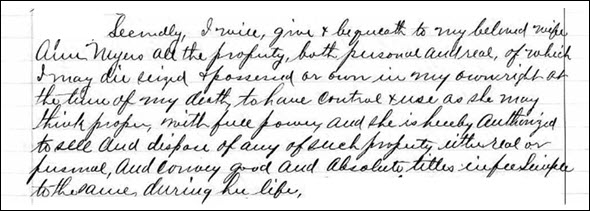The worth of a doc’s each phrase
Reader J. Paul Hawthorne got here throughout some language in a late nineteenth century will, and questioned if he was studying it proper.
On the twenty ninth of April 1879, Elisha Myers of Butler County, Alabama, executed a will leaving every part to his spouse Ann, however on her dying something remaining was to be divided amongst his 4 kids: sons James, William and Pryer, and daughter Ann (Myers) Albertson. Myers then died on 14 July 1886 and the need was admitted to probate on 7 December 1891.
“To me, it seems to be just like the husband will get ‘energy’ even after the spouse dies,” Paul wrote. “Principally, she will get every part after he dies, actual and private. Nice… Excellent. However, when she dies (based on his needs), every part will get cut up up between their kids.”
So, he needed to know, “What if the spouse decides to make her personal Will? What if she decides to provide what’s left to a charity or a sibling, and NOT her kids? Does her Will overrule his? Or, do his needs stand?”
Nice query — as a result of that is at a time when married girls have been gaining extra property rights, amongst them the correct to make their very own wills. Alabama had been one of many earliest states to go a Married Lady’s Property Act, in 1848, and a historic assessment of wills of propertied Alabamians means that wives obtained outright possession of property from their husbands as typically as half the time within the years main as much as the Civil Struggle.
And it’s an ideal query — as a result of we don’t really want to take a look at the regulation for the reply.
As a result of the reply is true within the will.

You see, Elisha Myers didn’t merely depart every part to his spouse Ann. He left her every part “to have management & use as she might imagine correct, with full energy, and she or he is hereby licensed to promote and eliminate any of such property both actual or private, and convey good and absolute titles in price Easy to the identical, throughout her life.”
Learn that once more.
Taking out among the phrases to make it clearer: he left her every part “to have management & use as she might imagine correct, … throughout her life.”
It’s these phrases — “management & use … throughout her life” — that make all of the distinction on this planet.
That is in actuality a life property, by definition, “An property whose length is restricted to the lifetime of the celebration holding it, or of another particular person; a freehold property, not of inheritance.” This isn’t absolute possession. He’s giving her the correct to make use of and management every part, even as much as and together with promoting off the land if she selected to — however solely throughout her lifetime.
It’s a really liberal life property to make sure, but it surely’s nonetheless a life property. Something left over on the time of her dying then goes to the youngsters.
So sure, certainly, Paul is true: the husband right here is exercising energy past the grave to manage the disposition of property after his spouse’s dying.
However due to these few phrases within the doc, it’s his property that he’s controlling, not hers. He by no means gave her full possession; he solely gave her a life property.
It’s an ideal instance of the worth of a doc’s each phrase — and why we as genealogists have to be certain we’re studying and recording and correctly understanding each a type of phrases.
Cite/hyperlink to this submit: Judy G. Russell, “Energy past the grave,” The Authorized Genealogist (https://www.legalgenealogist.com/weblog : posted 31 July 2023).
SOURCES




